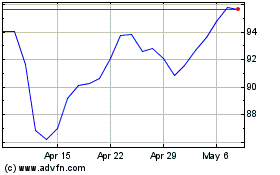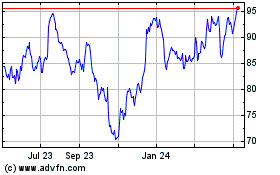By Liz Hoffman and David Benoit
Activist investor ValueAct Capital Management LP disclosed
Monday that it had taken a $1.1 billion stake in Morgan Stanley,
signaling a potential rallying cry for bank investors after years
of poor returns.
ValueAct's stake of 38 million shares represents about 2% of the
shares outstanding in Morgan Stanley. But unlike most activist
positions, ValueAct says it is the market, not the company, that
has it wrong.
"We believe there is a disproportionate amount of time and
energy spent overanalyzing Morgan Stanley's trading and lending
business and fretting about its Fed oversight," Jeffrey Ubben,
ValueAct chairman and chief executive, wrote in a quarterly letter
to investors that was reviewed by The Wall Street Journal. "It
feels like missing the forest for the trees."
The stake could represent a catalyst for investors who have
shunned bank stocks for years, due mainly to low interest rates
that sap lending profits and tough postcrisis rules that have taken
much of the risk -- and profit -- out of once-lucrative trading
businesses.
Over the past decade, Morgan Stanley and other big banks have
sought to make themselves slimmer and simpler, becoming less
reliant on the risky businesses that once powered their earnings.
But it has been a struggle to convince investors.
Morgan Stanley shares are down 22% over the past year, the worst
performer of the largest U.S. banks and compared with a 10% decline
in the KBW Nasdaq bank index, itself a laggard in the broader stock
market.
Morgan Stanley's shares have regularly traded below book value,
a symptom it shares with other banks including Citigroup Inc. and
Bank of America Corp. Banks regularly traded for a multiple of
their book value before the financial crisis. Their fall is a sign
that investors don't see a return to rapid profit and revenue
growth any time soon.
VaueAct, which manages $16 billion in assets, said the market is
misunderstanding the New York bank, keeping the stock price low
based on the bank's exposure to stock and bond trading
businesses.
But ValueAct believes that overlooks the current focus of the
bank, whose earnings are now more geared toward giving advice to
corporations and a massive wealth-management business in which
brokers advise individuals how to invest. Those operations
typically generate fees with less risk and less volatility. Morgan
Stanley's chairman and chief executive, James Gorman, has called
wealth management, for example, a "ballast" that can smooth out the
choppier earnings from investment banking and trading.
ValueAct, which has successfully lobbied for change at companies
like Microsoft Corp. and last year took a stake and then sold out
of American Express Co., isn't planning to call for any major
changes at the bank and backs Mr. Gorman, people familiar with the
matter said.
"As with any investor, we welcome ValueAct as a shareholder," a
Morgan Stanley spokesman said in a statement.
Morgan Stanley's return on equity, a closely watched measure of
bank profitability, has also lagged behind Wall Street rivals and
remains below Mr. Gorman's stated goal of 10% by next year.
Mr. Gorman has been pushing for years the message that Morgan
Stanley is a far different firm than the one that nearly collapsed
during the financial crisis. Morgan Stanley's future lies more in
the lower-risk businesses of advising companies and wealthy
individuals. Under Mr. Gorman, the bank has expanded its
wealth-management business aggressively and maintained its No. 2
spot in merger advice.
Mr. Ubben said he valued the bank on the more utility-like
profits Morgan Stanley can earn reliably, rather than on the
unpredictable trading revenue that once powered it.
ValueAct is well known as an activist investor, an approach in
which investors take a stake in a company and then press for
strategic, managerial, financial or other changes.
ValueAct took a roughly $1 billion stake in AmEx in 2015 but
sold the position that November after discussions with the
company's management gave the hedge fund the impression the company
wasn't prepared to make changes it thought were needed, The Wall
Street Journal previously reported.
Most recently ValueAct has been contending with problems in one
of its once-most-lucrative investments, Valeant Pharmaceuticals
International Inc., where shares are down about 90% from last
summer.
Morgan Stanley in 2013 drew an investment from fellow activist
Third Point. But that investment was much smaller, about $150
million, and only lasted a few months, with little long-term impact
on the bank.
"The banking industry is ripe for activism," notes CLSA analyst
Mike Mayo. "It probably doesn't make for a pleasant August for
Morgan Stanley management," but investors should view the news as
"fantastic" because the presence of a potentially vocal activist
means that "someone is carrying the torch for them."
ValueAct has had discussions with Morgan Stanley management, a
person familiar with the matter said.
The firm bought shares of Morgan Stanley at about 0.7 times book
value, according to the letter. Over the past year, the bank's
stock has traded as high as 1.1 times and as low as 0.6 times the
value of its assets, according to FactSet.
Write to Liz Hoffman at liz.hoffman@wsj.com and David Benoit at
david.benoit@wsj.com
(END) Dow Jones Newswires
August 15, 2016 20:45 ET (00:45 GMT)
Copyright (c) 2016 Dow Jones & Company, Inc.
Morgan Stanley (NYSE:MS)
Historical Stock Chart
From Mar 2024 to Apr 2024

Morgan Stanley (NYSE:MS)
Historical Stock Chart
From Apr 2023 to Apr 2024
